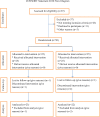The effects of ginger on fasting blood sugar, hemoglobin a1c, apolipoprotein B, apolipoprotein a-I and malondialdehyde in type 2 diabetic patients
- PMID: 25561919
- PMCID: PMC4277626
The effects of ginger on fasting blood sugar, hemoglobin a1c, apolipoprotein B, apolipoprotein a-I and malondialdehyde in type 2 diabetic patients
Abstract
Diabetes mellitus is the most common endocrine disorder, causes many complications such as micro- and macro-vascular diseases. Anti-diabetic, hypolipidemic and anti-oxidative properties of ginger have been noticed in several researches. The present study was conducted to investigate the effects of ginger on fasting blood sugar, Hemoglobin A1c, apolipoprotein B, apolipoprotein A-I, and malondialdehyde in type 2 diabetic patients. In a randomized, double-blind, placebo-controlled, clinical trial, a total of 41 type 2 diabetic patients randomly were assigned to ginger or placebo groups (22 in ginger group and 19 in control group), received 2 g/day of ginger powder supplement or lactose as placebo for 12 weeks. The serum concentrations of fasting blood sugar, Hemoglobin A1c, apolipoprotein B, apolipoprotein A-I and malondialdehyde were analyzed before and after the intervention. Ginger supplementation significantly reduced the levels of fasting blood sugar, hemoglobin A1c, apolipoprotein B, apolipoprotein B/apolipoprotein A-I and malondialdehyde in ginger group in comparison to baseline, as well as control group, while it increased the level of apolipoprotein A-I (p<0.05). It seems that oral administration of ginger powder supplement can improves fasting blood sugar, hemoglobin A1c, apolipoprotein B, apolipoprotein A-I, apolipoprotein B/apolipoprotein A-I and malondialdehyde in type 2 diabetic patients. So it may have a role in alleviating the risk of some chronic complications of diabetes.
Keywords: Apolipoproteins; Diabetes mellitus; Ginger; Glycemic status; Malondialdehyde.
Figures
Similar articles
-
The Effects of Ginger on Fasting Blood Sugar, Hemoglobin A1c, and Lipid Profiles in Patients with Type 2 Diabetes.Int J Endocrinol Metab. 2017 Aug 27;15(4):e57927. doi: 10.5812/ijem.57927. eCollection 2017 Oct. Int J Endocrinol Metab. 2017. PMID: 29344037 Free PMC article.
-
The effect of an oral ginger supplementation on NF-κB concentration in peripheral blood mononuclear cells and anthropomorphic data of patients with type 2 diabetes: A randomized double-blind, placebo-controlled clinical trial.Complement Ther Med. 2019 Feb;42:7-11. doi: 10.1016/j.ctim.2018.10.019. Epub 2018 Oct 26. Complement Ther Med. 2019. PMID: 30670285
-
Anti-inflammatory effects of zingiber officinale in type 2 diabetic patients.Adv Pharm Bull. 2013;3(2):273-6. doi: 10.5681/apb.2013.044. Epub 2013 Aug 20. Adv Pharm Bull. 2013. PMID: 24312847 Free PMC article.
-
Effect of treatment of iron deficiency anemia onhemoglobin A1c in type 2 diabetic patients.Turk J Med Sci. 2017 Nov 13;47(5):1441-1446. doi: 10.3906/sag-1601-27. Turk J Med Sci. 2017. PMID: 29151315
-
Ginger: A Nutraceutical Supplement for Protection Against Various Cardiovascular Diseases in Clinical Trials.Cureus. 2025 Mar 19;17(3):e80841. doi: 10.7759/cureus.80841. eCollection 2025 Mar. Cureus. 2025. PMID: 40255738 Free PMC article. Review.
Cited by
-
Effect of the Consumption of Species from the Zingiberaceae or Berberidaceae Family on Glycemic Profile Parameters: A Systematic Review and Meta-Analysis.Int J Mol Sci. 2025 Jun 10;26(12):5565. doi: 10.3390/ijms26125565. Int J Mol Sci. 2025. PMID: 40565030 Free PMC article. Review.
-
The Effect of Ginger (Zingiber officinale Roscoe) Aqueous Extract on Postprandial Glycemia in Nondiabetic Adults: A Randomized Controlled Trial.Foods. 2023 Mar 1;12(5):1037. doi: 10.3390/foods12051037. Foods. 2023. PMID: 36900554 Free PMC article.
-
The Antidiabetic Activity of Nigella sativa and Propolis on Streptozotocin-Induced Diabetes and Diabetic Nephropathy in Male Rats.Evid Based Complement Alternat Med. 2017;2017:5439645. doi: 10.1155/2017/5439645. Epub 2017 Feb 16. Evid Based Complement Alternat Med. 2017. PMID: 28298934 Free PMC article.
-
A Scoping Review of the Clinical Evidence for the Health Benefits of Culinary Doses of Herbs and Spices for the Prevention and Treatment of Metabolic Syndrome.Nutrients. 2023 Nov 22;15(23):4867. doi: 10.3390/nu15234867. Nutrients. 2023. PMID: 38068725 Free PMC article.
-
Isolation of 6-gingerol and semi-synthesis of 1,4-benzodiazepines derivatives: An in-situ pharmacokinetics properties, molecular docking and molecular dynamics simulation assessments.Saudi J Biol Sci. 2024 Aug;31(8):104048. doi: 10.1016/j.sjbs.2024.104048. Epub 2024 Jun 10. Saudi J Biol Sci. 2024. PMID: 38988339 Free PMC article.
References
-
- Li Y, Tran VH, Duke CC, Roufogalis BD. Gingerols of Zingiber officinale enhance glucose uptake by increasing cell surface GLUT4 in cultured L6 myotubes. Planta. Medica. 2012;78:1549–1555. - PubMed
-
- Elshater A-EA, Muhammad MA Salman, Mahrous MA Moussa. Effect of ginger extract consumption on levels of blood glucose, lipid profile and kidney functions in Alloxan induced-diabetic rats. Egypt. Acad. J. Biology. Sci. 2009;2:153–162.
-
- Shanmugam K R, Ramakrishana Ch, Mallikarjuna K, Sathyavelu Reddy K. The impact of ginger on kidney carbohydrate metabolic profiles in STZ induced diabetic rats. . Asian. J. Exp. Sci. 2009;23:127–134.
-
- Esteghamati A, Gouya MM, Abbasi M, Delavari A, Alikhani S, Alaedini F. Prevalence of diabetes and impaired fasting glucose in the adult population of Iran. Diabetes Care . 2008;31:96–98. - PubMed
-
- Madkor HR, Mansour SW, Ramadan G. Modulatory effects of garlic, ginger, turmeric and their mixture on hyperglycemia, dyslipidemia and oxidative stress in streptozotocin-nicotinamide diabetic rats. Br. J. Nutr. 2011;105:1210–1217. - PubMed
LinkOut - more resources
Full Text Sources

